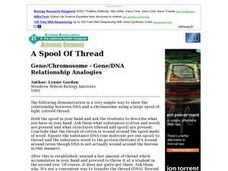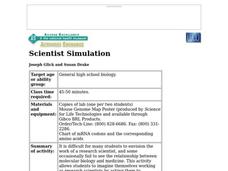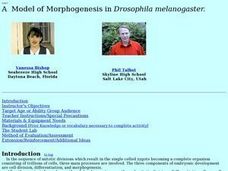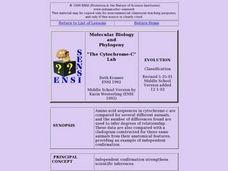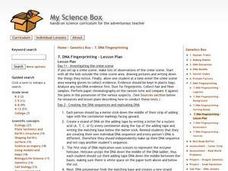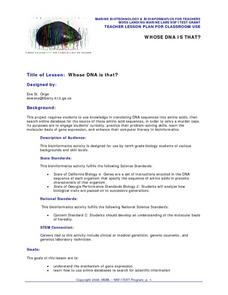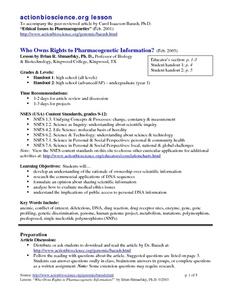Curated OER
A Spool Of Thread
Students describe a spool of light colored thread that the teacher holds in his/her hands. They are asked what substances (cotton and wood) are present and what structures (thread and spool) are present. The teacher conclude that the...
Curated OER
Scientist Simulation
Students imagine themselves working as research scientists completing the end-steps of a molecular research project and interpreting the data. They compare the gene sequences of normal and abnormal mice and evaluate the protein product...
Curated OER
A Model of Morphogenesis in Drosophila Melanogaster
Students investigate the following scientific terms and ideas: rates of diffusion, the role of morphogens in the development of larva, the chemical dynamics of a cell, and the significance of embryo polarity during development.
Virginia Department of Education
Genetic Variation and Mutations
Young scientists demonstrate their creativity while completing several activities, to assess genetic variations and mutations. Instructors provide a list of options and scientists choose to write a comic strip, create a book, construct a...
Virginia Department of Education
DNA Structure, Nucleic Acids, and Proteins
What is in that double helix? Explain intricate concepts with a variety of creative activities in a lesson that incorporates multiple steps to cover DNA structure, nucleic acids, and proteins. Pupils explore the history of DNA structure,...
Virginia Department of Education
Biotechnological Issues and Bioethics
Culminate a bioethics unit with the implementation of a lesson that incorporates the Socratic method to encourage class feedback and participation. Pupils participate in a discussion on bioethics and morality, complete a writing seminar,...
Curated OER
What Should You Know about Classification?
Many learners have a tough time picking out pertinent information from a text or in class. Sometimes, all it takes is a study/reading guide to show them the way. The worksheet here focuses on taxonomy and classification, including...
Serendip
Genetic Engineering Challenge – How Can Scientists Develop a Type of Rice That Could Prevent Vitamin A Deficiency?
Brown rice contains vitamins B and E, while white rice lasts longer in storage. The availability of rice around the world makes it a great candidate for genetic engineering. Scholars apply their knowledge of genetic engineering to solve...
Curated OER
Genetic Ethics Debate
Students select topics relating to bioethical questions which they research and debate. They, in groups, select topics and are given two to three weeks to research their topics, taking advantage of their school libraries and local public...
Serendip
UV, Mutations, and DNA Repair
How effective are cells at repairing UV damage? An inquiry-based lesson has learners experiment with organism by exposing them to various levels of UV light and then examining their DNA after a period of time. Pupils test different...
Curated OER
Viruses and Bacteria
Reviewing the key terms and ideas from a chapter about viruses and bacteria, this activity helps students to reinforce their knowledge about the makeup and life cycle of a virus. Students answer true/false questions, blanks from a word...
Curated OER
The Cytochrome-C Lab
Learners examine a method biologists use to try to determine relationships. They examine how amino acid sequences have been determined for a number of proteins, and how scientists can make inferences about DNA based on the amino acid...
Curated OER
Genetically Modified Organisms
High Schoolers complete a variety of activities as they examine the ethics of (and take a position concerning) genetically modified organisms in the field of agriculture. They complete a PowerPoint demonstration to go along with the unit.
Curated OER
DNA Fingerprinting
Students study the process of DNA Fingerprinting and how DNA Fingerprinting is used in solving crimes. They examine a crime scenario that involves collecting DNA Fingerprinting information from blood collected at the crime scene. They...
Curated OER
Proteins Expressed At Different Stages
Students investigate protein electrophoresis in a lab setting. Full laboratory equipment is needed and safety should be taught. The level of prior knowledge needed to perform lab is high and is ideal for an honors class.
Curated OER
Bacterial Transformation
Students discuss a bacterial experiment they previously performed and complete a pre-assessment. They participate in a lecture discussion given by the teacher through PowerPoint and then complete a cartoon worksheet and post-assessment.
Curated OER
Genetics 5 Technology
Learners, after studying extraction and gel electrophoresis, recombinant DNA, transgenic organisms, and reproductive cloning, summarize the main concepts in DNA technology. They analyze the applications of DNA: forensics, medicine,...
Curated OER
Asexual versus Sexual Reproduction
Students explore reproduction. They research organisms and groups of organisms to determine whether they reproduce sexually or asexually. In addition, they determine the organism's habitat.
Curated OER
Whose DNA Is That?
Students investigate the use of technology in order to identify different sequences of amino acids by using online web tools. They enhance problem solving skills with amino acid identification skills and strengthening comfort with using...
Curated OER
The Genetic Basis of Neurological Disorders
Young scholars describe some aspects of known genetic defects on the human neurological condition. They participate in a variety of exercises including drawings, games, and analogies.
Curated OER
Zoology Word Search Puzzle
In this science worksheet, middle schoolers look for the words that are related to the concept of zoology that is reviewed in the sheet. They also acquire new vocabulary.
Curated OER
Alcohol Tolerance in Drosophila and You
Students develop and run a laboratory comparing alcohol tolerance in flies with and without the ADH enzyme.
Curated OER
Who Owns Rights to Pharmacogenetic Information?
Students develop an understanding of the rationale of ownership over scientific information. They research commercial applications of DNA sequences. They analyze how to evaluate medical ethics issues.
Curated OER
GMOs: Should We Grow Them?
Students examine the ethics of biotechnology and genetically modifying various organisms. They complete various activities and labs on GMOs and then write a position paper regarding their individual opinions on the subject.


